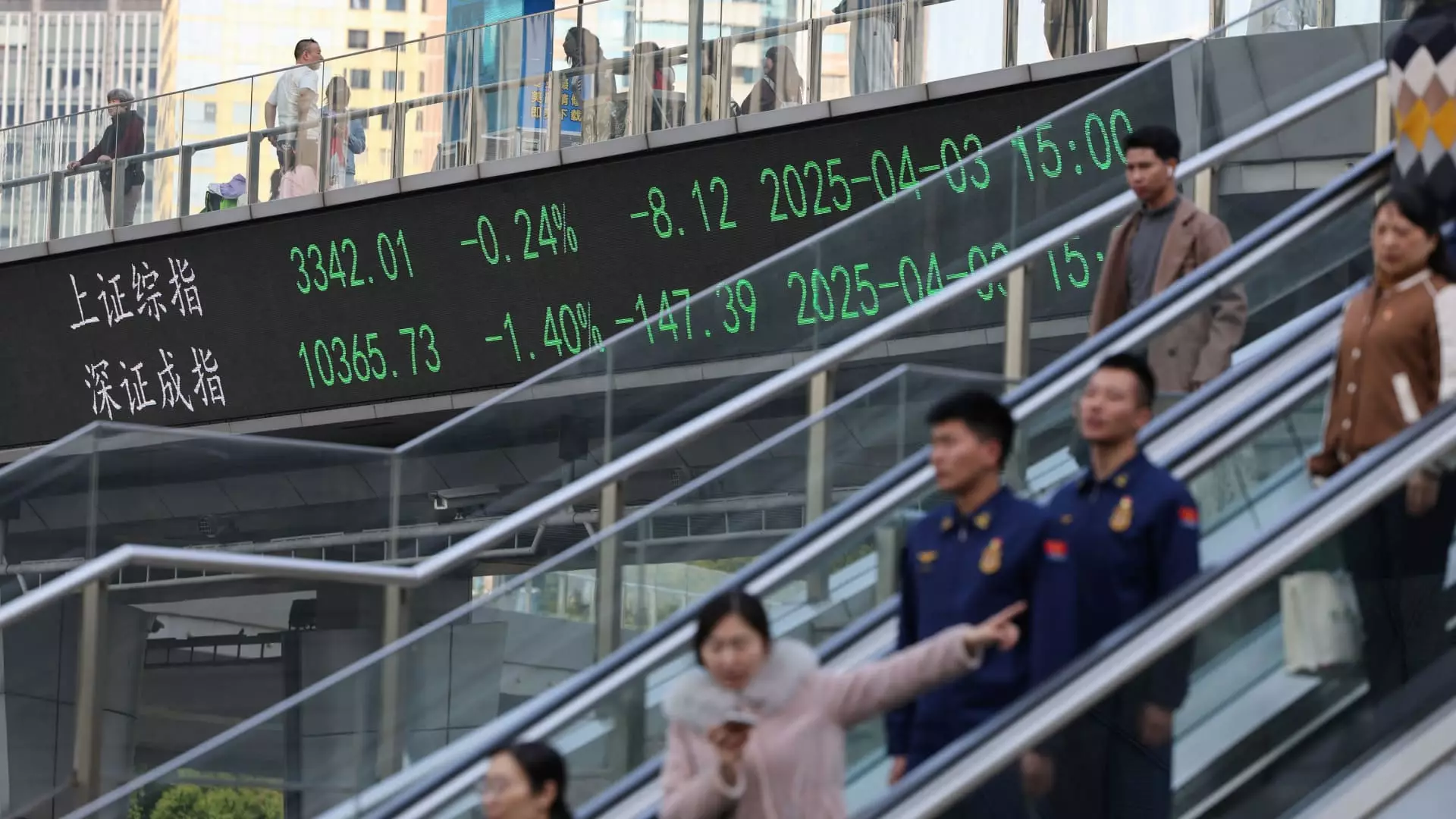As global investors grapple with the concerns surrounding escalating tariffs from the U.S. towards China, the resilience of China’s technology sector shines through remarkably. The recent wave of tariffs has indeed sent shockwaves through financial markets, and Chinese stocks initially dipped significantly. However, the eventual resurgence, with stocks closing well off their lows, offers a narrative of perseverance that is too pivotal to overlook. In fact, many analysts—including Kai Wang from Morningstar—have expressed optimism that the tech sector will continue its upward trajectory fueled by a burgeoning interest in domestically produced generative artificial intelligence.
It is essential to recognize the underlying dynamics of the situation. While tariffs typically evoke fears of economic slowdown, the reality is that a considerable portion of Chinese tech firms has limited exposure to the American market. This mitigates the immediate impact that tariffs have on their operations and valuations. In times of economic adversity, there’s a tendency for markets to overreact, a phenomenon Wang suggests is currently in play.
The Contrasting Valuations: China vs. the West
When placed under the lens of valuation, Chinese tech stocks offer a striking contrast against their U.S. counterparts. Analysts from Citi have pointed out that the price-to-earnings (P/E) ratios for leading Chinese tech companies are an astounding 52% lower than those of the U.S.’s “Magnificent Seven.” This divergence not only underscores a lucrative investment opportunity but also indicates that Chinese tech companies are undervalued in the grand scheme of global markets.
What’s more compelling is the expectation that this discrepancy will eventually normalize. The historical average of P/E ratios for Chinese tech stocks over the last five years stands at a much healthier 33%. As speculations run wild about possible fiscal policy interventions by the Chinese government to bolster the economy amid macroeconomic uncertainties, the tech sector finds itself in a fortuitous position to ride a wave of recovery.
Investing in the Right Sectors: A Strategic Pivot
Given the shifting ground caused by tariffs, investors are re-evaluating their strategies, opting for domestic plays over those dependent on exports. Citi has notably leaned towards sectors such as services and internet technology, illustrating a broader trend among analysts, who favor growth-oriented investments. Companies like Tencent and BYD have emerged as frontrunners in this landscape, demonstrating both resilience and vast growth potential.
It is imperative to recognize that the current geopolitical landscape is encouraging a kind of investment conservatism that favors homegrown companies. The surge in interest from international investors further illustrates this shift; nearly 25% have recently expressed a more positive outlook on Chinese tech. This growing optimism amidst tariff-related uncertainty reflects a recognition of the strategic importance of investing in sectors with less exposure to external geopolitical frictions.
AI: The Game-Changer in China’s Tech Renaissance
One of the most fascinating developments in this context is the rising influence of artificial intelligence. Chinese startups, notably DeepSeek, have begun to roll out AI models that ambitiously claim superiority over established giants like OpenAI’s ChatGPT. This surge in AI innovation cannot be understated; not only does it enhance operational efficiencies for existing companies, but it also primes them for future growth while tackling rising costs sustainably.
Historically, technological advancements have been the lifeblood of economic expansion, and China’s strategic focus on AI investment aims to propel its companies into a new era of productivity. With supportive policies in place, this thrust toward AI adoption helps diminishes the anticipated negative ramifications of tariffs. Furthermore, it underscores the capability of Chinese tech firms to innovate independently of external influences, a crucial factor for long-term sustainability.
Health Care: An Unexpected Oasis
Interestingly, the healthcare sector stands as a relative safe haven amidst the chaotic landscape of tariffs. Many pharmaceuticals are exempt from the latest rounds of tariffs, making this sector less vulnerable. Analysts from Jefferies emphasize that not only do most Chinese biotech firms collaborate with U.S. partners, but they also possess operational efficiencies that could prove advantageous against traditional competitors.
This unique positioning allows healthcare companies, particularly biotechs like Wuxi Biologics, to enjoy a degree of insulation from tariff fluctuations. Jefferies has recently rated Wuxi Biologics favorably, with expectations of accelerated growth in 2025. As the dialogue surrounding healthcare costs continues to occupy both sides of the political spectrum in the U.S., this sector is well-positioned for fruitful international collaboration.
In a climate riddled with uncertainty and shifting political tensions, China’s technology sector showcases a resilience that deserves attention. Whether through strategic pivots into undervalued stocks or the steadfast progression in AI and healthcare, it provides an intriguing case study for liberal investors looking to navigate complex territories. The undeniable fact is that despite prevalent worries, the potential for growth remains vibrant in China’s tech landscape.

